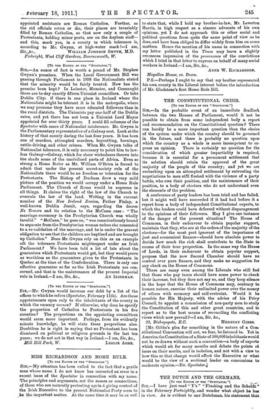[To THE Eamon OF THE "SPECTATOR.") SIR,—An ounce of fact
is worth a pound of Mr. Stephen Gwynn's promises. When the Local Government Bill was passing through Parliament in 1898 the Nationalists stated that the minority would be fairly treated. How has the promise been kept P In Leinster, Munster, and Connaught there are to-day exactly fifteen Unionist councillors. Or take Dublin City: if there is one place in Ireland where the Nationalists might be tolerant it is in the metropolis, where we may presume they have more educated followers than in the rural districts. The Unionists pay one-half of the Dublin rates, and yet there has not been a Unionist Lord Mayor appointed for over thirty years. I could fill columns of the Spectator with cases of Nationalist intolerance. Mr. Gwynn is the Parliamentary representative of a Galway seat. Look at the history of that county during the last four years. It has been one of murders, attempted murders, boycotting, burnings, cattle-driving, and other crimes. When Mr. Gwynn talks of Nationalist tolerance, it is only necessary to point him to law- less Galway—Galway, which for sheer wickedness throws into the shade some of the uncivilised parts of Africa. Even so strong a Home Ruler as Mr. William O'Brien is forced to admit that under the present secret-society rule of the Nationalists there would be no freedom or toleration for the Protestants. The Bishop of Durham drew a very mild picture of the position we would occupy under a Home Rule Parliament. The Church of Rome would be supreme in all things. It claims the right of the law of the Church to overrule the law of the land. Writing in the current number of the New Ireland Review, Father Finlay, a well-known Dublin Jesuit, says, regarding the decree Ne Temere and its relation to the McCann case : " The marriage ceremony in the Presbyterian Church was wholly invalid." " McCann," he goes on, " was conscientiously bound to separate from the Presbyterian woman unless she consented to a re-validation of the marriage, and he is under the gravest obligation to see that the children are baptised and are brought up Catholics." Does Mr. Gwynn rely on this as an example oft the tolerance Protestants mightexpect under an Irish Parliament P We have been told a lot of late about the guarantees which Protestants would get, but they would prove as worthless as the guarantees given to the Protestants in Quebec at the time of the Confederation. There is only one effective guarantee so far as the Irish Protestants are con. cerned, and that is the maintenance of the present Imperial






































 Previous page
Previous page